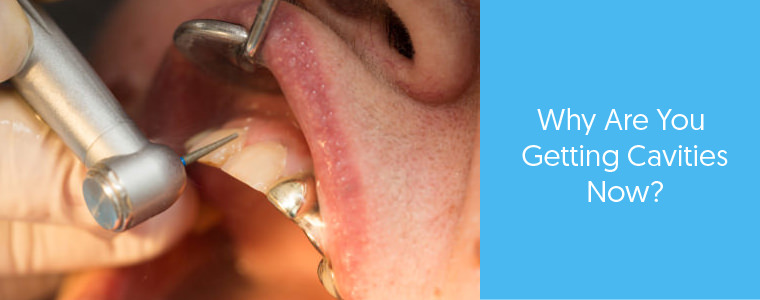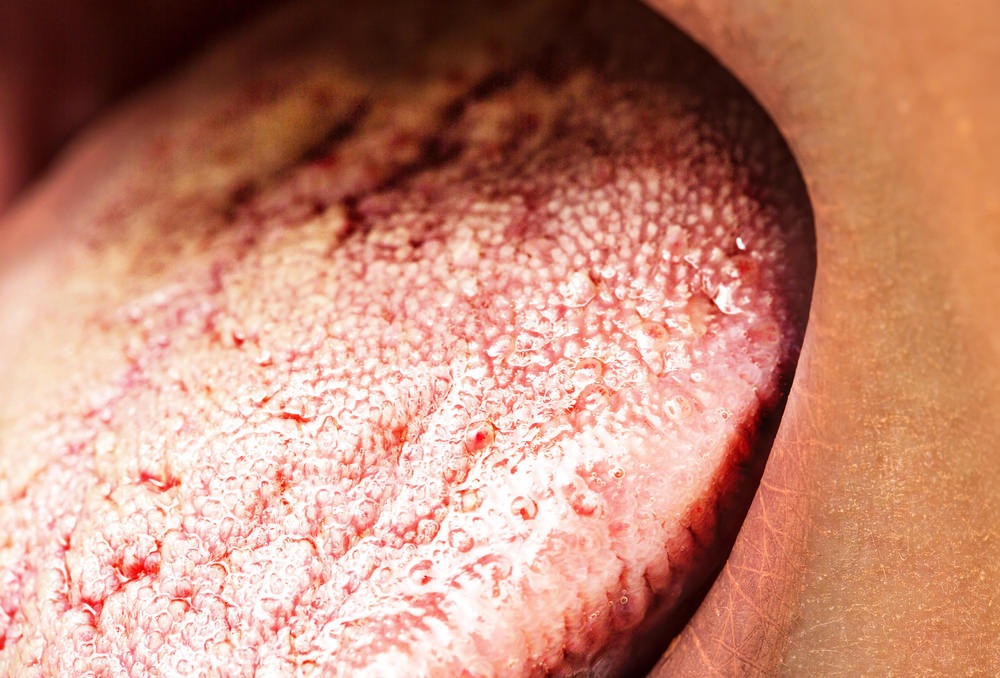Why am I All of a Sudden Getting Cavities?
Are you suddenly getting cavities when you’ve never had them before – I bet you also find yourself wondering, “why?”.
Dental cavities are most commonly the result of tooth decay, so if you happen to find yourself suddenly getting cavities, you need to reassess both your diet and your lifestyle.
If it’s happening to you, here’s what to know to help you find the cause.
What are Cavities?
Cavities (also called dental caries) are the result of tooth decay.
They occur when bacteria in your mouth turns into acids.
The bacteria, acid, food debris, and your saliva combine to form plaque, which clings to your teeth.
The acids in plaque softens your tooth’s enamel (the hard-outer surface of your tooth), and its dentine (the underlying layer).
If left untreated, this results in permanently damaged areas in the enamel, which develops into tiny holes in the tooth – known as a cavity.
Over time, these holes can grow bigger and may even end up destroying the whole tooth.
A dental cavity is one of the most common results of tooth decay.
Although many people think only children get cavities, they are also a common occurrence in adults.
So, if you find yourself suddenly getting a lot of cavities, you may also find yourself wondering, why?
What Could be the Cause Behind My Cavities?
If you find yourself getting cavities suddenly, one of the most important things you need to do is find out why.
Firstly – see your Dentist and get the treatment you require.
Secondly – find out what is causing the cavities, to stop you from getting more. As the saying goes, prevention is better than cure.
When somebody who never had many cavities before suddenly starts getting them, typically it’s an environmental change that is the cause.
Things to review are your diet or lifestyle.
Consider whether;
Have you made any changes to your daily routine? – One of the most likely causes of the sudden increase of cavities is changes to your lifestyle.
Think of things such as changes to your diet, whether you’ve started a new job, or taken up any new habits or hobbies.
Have you been keeping a good dental care regime? – It’s necessary to brush twice daily, floss, and rinse.
Poor oral health is the major cause behind tooth decay.
Have you been brushing your teeth too aggressively? – If you brush your teeth too hard, you’re possibly causing damage to the enamel on your teeth and creating cavities.
Are you feeling more stressed than usual? – You may not know the impact that stress has on your entire body – it can cause you inflammation, give you a dry mouth, cause you to start teeth clenching and grinding, or give you cravings for unhealthy foods.
All of these things can cause an increase in cavities.
Have you taken up a new exercise regime? – If you’ve started a new workout, such as joining the gym or jogging, you could be getting a dry mouth.
As saliva helps to neutralize the acid in your mouth, less saliva could lead to more decay and more cavities.
Have you made changes to your diet? – Be careful of certain foods that cling to your teeth for a long time, as these foods are more likely to cause decay than foods that are easily washed away by saliva.
Such foods include milk, ice cream, honey, sugar, soft drinks, dried fruit, cake, cookies, hard lollies, dry cereal, and chips.
Have you been eating more sugar? – If you have made unhealthy changes to your diet, such as increasing the amount of sugar you eat, this could be a cause behind the cavities.
Please note – when it comes to sugar, the length of time your teeth are exposed to the sugar is worse for them than the amount of sugar you eat.
For example, eating an entire block of chocolate all at once is better than sucking on lollies or sipping on soft drinks for hours.
Have you been eating foods with a higher acid content? – If you’ve exposing yourself to new foods or drinks that are more acidic, such as citrus fruit drinks, sports drinks, soft drinks or tomato source, you’re also running the risk of getting cavities.
Have you had a cold or flu? – If so, you may have had a sore throat and been sucking on cough drops constantly.
These too are a source of sugar that are a common cause of cavities.
Have you seen a new Dentist? – It’s sad to say, but dental fraud is a thing.
A common sign is visiting a new Dentist for the first time and having them prescribe you multiple new treatments.
It’s up to you to trust your instincts on this one – if you’ve never had issues with cavities, you follow a great dental care regime and see a Dentist for a check-up every 6 months, then perhaps you should think about getting a second opinion if a new Dentist suddenly tells you that you need 14 new fillings.
Do you have receding gums? – Gum recession exposes the root of your tooth.
The root of your tooth is below your gumline, and, unlike the rest of your tooth, it has no protective enamel covering it.
This makes it more vulnerable to cavities.
Have you recently undergone chemotherapy? – Chemotherapy can cause a dry mouth, which as we know makes you more susceptible to cavities.
Have you been suffering from certain medical conditions? – Certain medications or medical conditions, or radiation to your head or neck can all increase your risk of cavities by reducing your production of saliva.
Have you been suffering from heartburn? – Heartburn (or gastroesophageal reflux disease – GERD) can cause your stomach acid to flow into your mouth (through reflux).
This wears away the enamel of your teeth and causes severe damage to your teeth by exposing more of its’ dentine to attack bacteria, thus creating tooth decay.
Have you had an eating disorder? – Both anorexia and bulimia can lead to serious tooth erosion and cavities.
Repeated vomiting causes your stomach acid to wash over your teeth, which begins to dissolve the enamel. Eating disorders also can cause problems with the production of saliva.
Have you recently gotten braces? – If so, you might have had trouble brushing and flossing, leading to tooth decay and cavities.
Do you have old fillings or other dental devices? – Over time, dental fillings can weaken, break down or develop rough edges, allowing the build-up of plaque.
Dental devices can stop fitting well, allowing decay to form underneath them.
All of this plaque and decay can lead to cavities.
Have you been getting enough fluoride? – Fluoride helps prevent cavities and can even reverse the early stages of tooth damage.
Due to its benefits for teeth, fluoride is added to many public water supplies – but it is typically not found in bottled water.
It’s also a common ingredient in toothpaste and mouth rinses. Make sure you add it to your diet.
Symptoms for Cavities
Your dentist will find any cavities during your regular dental check-up, by probing your teeth, looking for soft spots, or using X-rays to check between your teeth.
You, however, may not notice the cavity at all. Symptoms vary depending on its location and its severity.
When a cavity is just beginning, you may not have any signs at all. However, as the decay gets larger, you may notice;
- Pain – A toothache is one of the most common cavity symptoms.
- Pressure – Tooth sensitivity to hot or cold foods or drinks, mild to sharp pain when biting, or eating or drinking something sweet, hot or cold.
- Noticeable holes or pits in your teeth – sometimes these are only visible on a dental x-ray.
- Brown, black or white staining on the surface of your tooth.
- Pus around a tooth.
If you notice any of these symptoms, visit your Dentist as soon as possible.
The more immediate the treatment from a Dentist, the quicker and easier your procedure will be.
Treatments for Cavities
Your treatment will depend on how bad the cavity is.
Your Dentist can identify and reverse the early signs of decay and diagnose cavities by examining your tooth’s surface.
An x-ray may be required to see if the cavity has gone from the enamel into the dentine or pulp of the tooth.
In adults, Dentists can apply sealants on teeth that have early signs of decay, only if the decay has not broken into the enamel.
Once the enamel is beyond fixing, your Dentist will have to fill the tooth.
Typically, your Dentist will remove the decayed portion of your tooth with a drill. Then they will fill the hole with a filling.
In more serious cases, when the root or pulp of your tooth is dead or damaged in a way that cannot be saved, the decay has reached the tooth pulp, and a root canal filling may be necessary.
Your Dentist will remove the nerve, blood vessels, and tissue along with the decayed portions of the tooth, and then fill in the roots with a sealing material. You may need a crown over the filled tooth.
Children
In children, both baby teeth and permanent teeth can be sealed.
To protect them from decay, Dentists can also apply fluoride varnish on their teeth.
If left untreated, a cavity will cause your tooth to wear down severely – eventually, the uncontrolled decay may even destroy the tooth completely.
You also run the risk of developing an infection known as an “abscess” that spreads beyond the root of the tooth.
For more natural ways to heal cavities, please see our articles “Foods that Heal Cavities – and Foods that Don’t”, and “Reversing Tooth Decay and Healing Cavities Naturally”.
Conclusion
It’s not unusual for an adult to all of a sudden start to develop cavities.
In order to keep your teeth safe and healthy, as soon as you notice any of the symptoms of a cavity, such as pain, tooth sensitivity, pressure, holes or staining on your tooth, see your Dentist for treatment.
After an onset of cavities has been diagnosed, it’s important to find out the cause behind them, to prevent them from occurring again.
Contemplate any changes you have made to your diet or lifestyle, especially new jobs, hobbies, exercises, foods, medicines or changes to your dental regime.
Discuss your concerns with your Dentist, as ensuring you stay happy, safe and stress-free will ensure your smile remains white and bright!
What was one thing you had to change in your lifestyle to improve your dental health?
By Dr. V
Created at October 29, 2019, Updated at January 25, 2025





